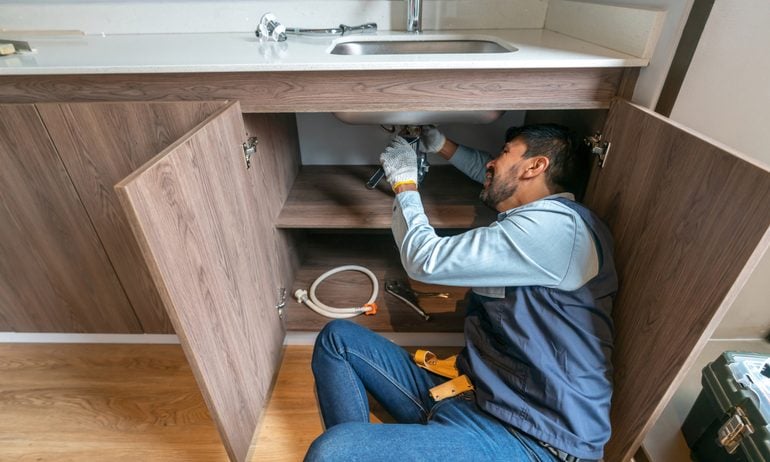Does Home Insurance Cover Plumbing Problems?
Homeowners insurance generally covers damage from sudden, accidental plumbing problems.

Many, or all, of the products featured on this page are from our advertising partners who compensate us when you take certain actions on our website or click to take an action on their website. However, this does not influence our evaluations. Our opinions are our own. Here is a list of our partners and here's how we make money.
Homeowners insurance will generally pay for damage due to sudden, accidental plumbing issues.
Standard home insurance typically does not cover damage caused by sump pump failure, flooding or negligence.
Add-ons like water backup and equipment breakdown coverage can help fill gaps in standard home insurance policies.
If something goes wrong in your plumbing system, you could find yourself with a soggy, expensive mess to clean up. You can turn to your homeowners insurance company for help — but whether it’ll pay for the damage depends on what caused it. Here’s what you need to know about home insurance and plumbing.
Does homeowners insurance cover plumbing problems?
Homeowners insurance will generally pay for damage due to sudden, accidental plumbing issues. Here are a few scenarios that a standard homeowners policy usually covers.
Burst pipes
You wake up after a frigid winter night to discover a sopping-wet basement. A pipe burst in the cold, and there’s water everywhere. Most homeowners policies will pay to repair damaged drywall and replace ruined carpets. (Note that most policies won’t cover the cost of repairing or replacing the pipe.)
Your insurer may not pay your claim if you could’ve done more to prevent the burst pipe. Say you were out of town and didn’t leave the thermostat at a temperature high enough to keep your pipes from freezing. The insurer might argue that the damage happened due to your negligence, which a homeowners policy won’t cover.
Appliance leaks
Your dishwasher springs a leak, sending soapy water all over your kitchen and to the basement below. Your homeowners policy probably would cover the cleanup as long as the leak was sudden and unexpected.
This coverage could also apply to plumbing problems with other appliances such as washing machines, water heaters, refrigerators and air-conditioning units. However, many policies exclude sump pump failures unless you’ve added water backup coverage. (More on that later.)
Another thing your policy won’t cover is the replacement or repair of the broken appliance. For this coverage, ask your insurer about equipment breakdown insurance. It’s a common add-on to a homeowners policy that will pay for mechanical or electrical failures of major appliances, including heating and cooling systems.
Overflowing toilets, bathtubs and sinks
You’re relaxing on the couch when water starts dripping on your head from the ceiling. You run upstairs to discover that one of your kids left the bathtub running, and it’s been overflowing for the past 20 minutes. Your homeowners policy will most likely cover any resulting damage from this type of accident.
Will your policy also pay for damage from a sink, tub or toilet that overflows because of a blocked drain or pipe? This is where it can get a little sticky.
Homeowners insurance will often cover water that backs up into your house as long as the blockage is within the plumbing system on your property. But if the problem is in a public sewer system, your insurer typically won’t cover it unless you’ve added water backup coverage to your policy. The exact coverage you have depends on where you live and the terms of your policy.
If you’re unsure about your coverage, read your policy carefully or reach out to your agent or insurer.
Other causes of pipe damage
Homeowners insurance covers a range of other incidents that could damage your pipes. This could include scenarios like a kitchen fire or a blizzard that knocks a tree onto your house. Damage to pipes under circumstances like these would generally fall under the dwelling coverage section of your policy. Dwelling coverage pays to repair damage to the structure of your home.
Which plumbing problems aren’t covered?
All insurance policies have things they won’t cover. Here are a few common ones, along with how you might be able to add extra coverage.
Sewer backups and sump pump failure
As mentioned above, many homeowners policies won’t pay for damage if your sewer system backs up or your sump pump breaks down. If you want help dealing with these claims, ask your insurer about adding water backup coverage to your policy.
Note that water backup coverage won’t pay the cost of replacing a broken sump pump — it’ll pay only for the damage that resulted from the failure. Consider adding equipment breakdown coverage if you want your insurer to pay for failing appliances such as sump pumps.
Flooding
When it comes to insurance, flooding generally refers to water that enters your home from sources like an overflowing river, a tidal surge or heavy rain that the ground can’t absorb fast enough. Homeowners insurance doesn’t cover flooding unless you’ve specifically added flood coverage to your policy.
So if a flood damages your plumbing — for example, by washing soil or debris into your pipes — your homeowners policy likely wouldn’t pay to fix it.
Learn more about how to find the best flood insurance.
Maintenance or general wear and tear
Insurance exists to pay for sudden, accidental expenses, not for regular home maintenance. So your homeowners policy usually won’t pay for a plumber to fix a leaky faucet or replace older pipes that are starting to corrode.
Insurers expect their policyholders to properly maintain appliances and other parts of their property. If you noticed a small leak under your bathroom sink but didn’t take steps to fix it before it got worse, your insurer may deny your water damage claim due to negligence.
Should you file a claim for plumbing problems?
When deciding whether to file a claim, consider the type of problem and the amount of damage. If the cause of the damage was a sudden accidental event, you’re more likely to have coverage than if the problem was a slow leak or another maintenance issue. For claims you’re not sure about, your insurance agent may be able to talk through your options with you.
It may not be worth filing a claim if the damage is relatively minor. Most homeowners claims are subject to a deductible, an amount your insurer will subtract from your payout. Say you have a $1,000 deductible and your burst pipe caused $750 worth of damage. Your insurer won’t pay anything.
Because insurance companies tend to raise rates after you file a claim, you may decide to pay for smaller problems on your own.
Learn more about how to file a home insurance claim.
How to prevent plumbing problems
Below are a few ways to head off plumbing issues before they cause major damage.
Check for leaks
Regularly inspect the water seals on appliances like your dishwasher, water heater, washing machine and refrigerator. This is especially important as your appliances get older and are more likely to break down.
Keep drains moving
Pipes can get clogged over time with hair, grease, food and other substances. To prevent this:
Flush drains regularly with hot water. Baking soda and vinegar can also help break up clogs.
Use a mesh screen to catch hair in showers and bathtubs.
Put food and grease in the trash instead of in the kitchen sink.
Don’t flush anything down your toilet except toilet paper and human waste.
Act quickly
Don’t ignore potential signs of a leak such as a loss of water pressure or an unexpectedly high water bill. A plumber may be able to keep a minor issue from turning into a major problem.
Turn to technology
Consider buying a smart water leak detector (or several). You can place these devices near leak-prone appliances and receive alerts on your phone if they detect water. More expensive devices can monitor your entire plumbing system and shut off the water automatically if they sense a problem.
Some homeowners insurance companies offer discounts for having these and other types of smart-home technology.
Keep pipes from freezing
When the weather gets cold, set your thermostat at a minimum of 55 degrees, even if you’re not at home. This helps keep pipes warm. Open cabinet doors under your bathroom and kitchen sinks to let heated air circulate around the pipes, and turn faucets to a slow drip. Insulating exposed pipes is also helpful.





